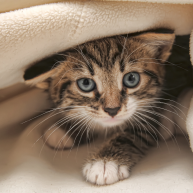In This Article
In This Article
Curious about your mysterious feline friend? A cat DNA test can unlock fascinating insights hidden within their genes. From understanding potential health risks to exploring their ancestry, genetic testing offers valuable information for loving cat parents.
Using a simple cheek swab, these tests analyze your cat's unique genetic makeup. While not a crystal ball, the results can empower you to provide even better care. Here are ten compelling reasons why you might consider getting a DNA test for your cat.
Knowledge is power when it comes to health. Cat DNA tests screen for specific genetic markers associated with certain hereditary diseases.
Know Your DNA Reviews

Are you curious about your cat's ancestry and health predispositions?
DNA results provide personalized health information for your vet. Knowing about specific genetic predispositions helps tailor your cat's preventive care plan effectively.
For example, if your cat carries a marker for a heart condition, your vet might recommend more frequent cardiac check-ups. If a kidney issue marker is found, regular kidney function tests might be advised. This targeted approach focuses preventive efforts.
Ever wonder if your rescued tabby has some Siamese or Maine Coon lurking in their family tree? DNA tests can shed light on your cat's breed mix.
While results for mixed-breed cats often show broad regional groups, discovering potential purebred ancestors can be fun. It helps paint a fuller picture of the unique heritage that makes your cat special.
Why does your cat have stunning blue eyes or a fluffy long coat? DNA tests can reveal the genetic markers influencing physical features.
You can learn about the genes controlling:
It's a fascinating glimpse into the genetic blueprint that defines your cat's appearance.
Knowing your cat's blood type is crucial information, especially in case of an emergency requiring a transfusion. Some DNA tests include blood type analysis.
Having this information readily available can save precious time if your cat ever needs urgent veterinary care involving blood products.
Does your cat look just like a Russian Blue but act nothing like the breed description? Physical appearance isn't always linked to genetic breed heritage.
A DNA test can confirm whether your cat actually carries genetic markers for the breeds they resemble. It helps separate visual similarities from actual ancestry.
While DNA doesn't dictate personality, knowing breed ancestry might offer subtle clues. Some breeds have general tendencies towards higher energy levels or specific sensitivities.
This information, discussed with your vet, could potentially inform choices about enrichment (like climbing trees for active breeds) or diet. However, always prioritize your cat's individual needs and your vet's advice over general breed traits.
Many DNA testing companies use anonymized data for research, with owner consent. By testing your cat, you can become a "citizen scientist."
Your cat's genetic information can contribute to studies that help researchers understand feline diseases better. This collective effort can lead to improved diagnostics and treatments for all cats in the future.
Some testing platforms offer DNA matching features. If your cat's siblings, parents, or cousins have also been tested, you might find a match.
This can be particularly exciting for owners of adopted cats with unknown backgrounds. It sometimes leads to discovering littermates or connecting with owners of related cats.
Worrying about potential hereditary conditions common in certain breeds can be stressful. A DNA test can provide reassurance.
If your cat tests clear for the specific disease markers included in the panel, it can ease concerns about those particular inherited risks. Remember, though, a clear test doesn't rule out all health issues, just the specific genetic ones screened for.
A cat DNA test is a tool that offers insights, not definitive answers. Always discuss the results, especially health findings, with your veterinarian. They can help you interpret the information and make the best care decisions for your beloved feline companion.
Know Your DNA Reviews

What could be more fun than learning everything there is to know about your feline friend?
